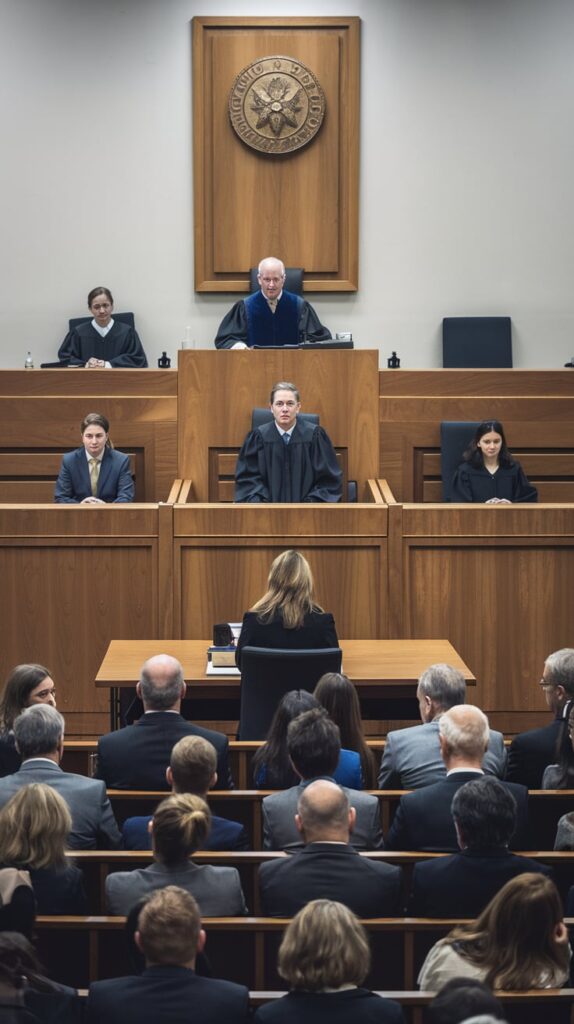Mastering the intricacies of the English language can elevate your writing and enhance your communication skills. One area that often trips up writers is the correct usage of possessive forms, especially with terms like “witness” or “witnesses.”
read more : Plurals of ‘Ox’ and ‘Fox’ – Grammar Beacon
In this comprehensive guide, we will delve into the distinctions between “witness,” “witnesses,” and their possessive forms: “witness’s,” “witness’,” and “witnesses’.” We’ll provide detailed scenarios to illustrate each usage and include a summary table to facilitate understanding.

What Is a Witness?
Before we jump into possessive forms, it’s crucial to clarify what a witness is. In legal terminology, a witness is someone who observes an event, usually one that has legal implications.
This could range from someone who sees an accident happen to an individual who testifies in court. A witness plays a critical role in the legal system, as their statements can significantly influence the outcome of a case.
read more : Agreeance vs Agreement – Grammar Beacon
Types of Witnesses
There are several types of witnesses, each serving a unique purpose in legal proceedings:
- Eyewitness: An individual who directly observes an event.
- Expert Witness: A specialist who provides expert opinions based on their field of knowledge.
- Character Witness: Someone who testifies to another person’s character, often to support their credibility or character.
The Importance of Witnesses in Legal Settings
Witnesses are pivotal in the legal framework. Their testimonies can establish facts, corroborate evidence, and provide context to a case. The reliability of a witness can sway juries and judges, making it essential for legal professionals to thoroughly vet and prepare witnesses before they take the stand.
Using “Witness” in Different Contexts
The Noun “Witness”
The term “witness” functions as both a noun and a verb. As a noun, it denotes the individual observing the event.
Example Scenario
- Scenario: The witness described the accident in detail.
In this sentence, “witness” serves as the subject, illustrating the individual providing crucial information.

Possessive Forms of Witness
Understanding the possessive forms of “witness” is vital for clear communication. Let’s dissect each form and its application.
read more : Excel or Accel – Grammar Beacon
Witness’s
“Witness’s” signifies possession for a singular witness. You use it when referring to something belonging to one witness.
Examples of Witness’s
- Scenario: The witness’s testimony was critical to the case.
Here, the testimony is specifically tied to one witness.
- Scenario: I reviewed the witness’s notes before the trial.
In this case, the notes belong to a singular witness, highlighting their importance.
Witness’
The form “witness’” can also indicate possession for a singular witness, though it’s often used in informal contexts.
Examples of Witness’
- Scenario: The witness’ account was inconsistent with the evidence presented.
In this example, the account belongs to a single witness, although the phrasing is less formal.
- Scenario: The lawyer questioned the witness’ credibility.
Once again, the credibility relates to the singular witness.
Witnesses
When discussing more than one witness, you use “witnesses.” This is simply the plural form, used to denote multiple individuals.
Examples of Witnesses
- Scenario: The witnesses gathered outside the courtroom after the trial.
This indicates the presence of multiple witnesses who observed the same event.
- Scenario: Several witnesses testified on behalf of the defendant.
Here, we see multiple individuals providing testimonies.
read more : Luis’ or Luis’s Possessives – Grammar Beacon
Witnesses’
To indicate possession for multiple witnesses, you would use “witnesses’.” This shows that something belongs to more than one witness.
Examples of Witnesses’
- Scenario: The witnesses’ statements were vital for the investigation.
In this instance, the statements belong to multiple witnesses, underscoring the collaborative nature of their input.
- Scenario: We need to review the witnesses’ testimonies before the hearing.
This indicates that the testimonies come from more than one witness, emphasizing the importance of their collective perspectives.

Summary of Possessive Forms
Here’s a quick overview of the possessive forms for clarity:
| Form | Usage | Example |
| Witness’s | Singular possession | The witness’s statement was compelling. |
| Witness’ | Alternative informal form for singular | The witness’ account was questionable. |
| Witnesses | Plural form | The witnesses were all present in court. |
| Witnesses’ | Plural possession | The witnesses’ testimonies supported the case. |
Common Confusions
Frequently Asked Questions
Is “Witness’s” or “Witness’” Correct?
Both forms can be correct, depending on context and formality. “Witness’s” is more standard, especially in formal writing, while “witness’” may appear in casual contexts.

When Should I Use “Witnesses’”?
Use “witnesses’” when discussing possessions or characteristics that belong to multiple witnesses, ensuring clarity in your writing.
read more : Skill-Set vs Skillset – Grammar Beacon
Real-World Applications
Understanding the distinctions between these terms is crucial, particularly in legal settings. Misusing them can lead to misunderstandings or misinterpretations of important information.
Writing Tips for Effective Use
- Identify the Subject: Determine if you’re discussing a single witness or multiple.
- Choose the Correct Form: Select between “witness,” “witness’s,” “witness’,” and “witnesses’” based on the context of your writing.
- Revise for Clarity: Reread your sentences to ensure they convey your intended meaning effectively.
Practical Examples
To further solidify your understanding, let’s look at additional examples that demonstrate each form in context.
Witness
- Scenario: The witness came forward with new evidence that changed the course of the trial.
Witness’s
- Scenario: After reviewing the witness’s report, the detective found inconsistencies that needed addressing.
Witness’
- Scenario: The witness’ demeanor raised questions among the jurors regarding his reliability.
Witnesses
- Scenario: The witnesses all corroborated the events of that fateful night, creating a solid case for the prosecution.
Witnesses’
- Scenario: The witnesses’ recollections of the incident were detailed and varied, providing a rich tapestry of evidence for the jury.
Enhancing Clarity in Writing
Using the correct possessive form enhances clarity and shows your command of the language. In legal documents, where precision is essential, the right usage can make a significant difference.
Importance of Precise Language
Clear language is critical in both spoken and written communication, especially in legal settings where misunderstandings can have serious consequences.
Using the correct form ensures that your audience understands exactly what you mean.
More Scenarios for Contextual Understanding
Different Situations Involving Witnesses

Let’s explore various situations where these terms apply, illustrating the importance of correct usage.
Scenario 1: A Traffic Accident
Imagine a traffic accident occurs at a busy intersection. Several individuals see the event unfold.
- Witnesses: The witnesses provided differing accounts of what transpired.
- Witness’s: One witness’s description stood out due to its clarity and detail.
- Witnesses’: The witnesses’ statements were crucial for the police report.
Scenario 2: A Court Trial
During a court trial, several witnesses are called to testify.
- Witness: The witness took the stand confidently, ready to recount the events.
- Witness’s: The judge examined the witness’s credibility before allowing them to proceed.
- Witnesses’: The witnesses’ testimonies painted a vivid picture of the incident in question.
Everyday Usage
These terms aren’t limited to legal contexts; they can apply in everyday conversations as well.
Scenario 3: Social Gatherings
At a family gathering, someone recounts a story about a neighbor who witnessed an unusual event.
- Witness: The witness to the bizarre occurrence couldn’t believe their eyes.
- Witness’s: According to the witness’s account, the event was quite unbelievable.
- Witnesses: Several witnesses reported seeing the same strange phenomenon.
Key Takeaways
- Clarity is Key: Using the correct possessive form improves understanding and avoids confusion.
- Context Matters: Always consider whether you’re discussing a single witness or multiple witnesses.
- Practice Makes Perfect: The more you practice, the more intuitive these rules will become.
Conclusion
Grasping the distinctions between “witness,” “witnesses,” and their possessive forms is essential for effective communication.
Whether you’re drafting legal documents, writing reports, or simply engaging in conversation, using the correct terms enhances clarity and professionalism.
With this guide, you’re now better equipped to navigate the nuances of these terms. Keep practicing, and don’t hesitate to revisit this information whenever you need a refresher. Remember, precise language is not just about correctness; it’s about conveying your message effectively.
Here’s a well-structured summary table that captures the key points regarding the terms “witness,” “witnesses,” and their possessive forms:
Summary Table of “Witness” and “Witnesses”
| Form | Type | Usage | Example |
| Witness | Noun (Singular) | Refers to one individual observing an event. | The witness described the accident in detail. |
| Witness’s | Possessive (Singular) | Indicates possession belonging to one witness. | The witness’s testimony was critical to the case. |
| Witness’ | Possessive (Singular, Informal) | Another form of possession for one witness, often used informally. | The witness’ account was inconsistent with the evidence. |
| Witnesses | Noun (Plural) | Refers to multiple individuals observing an event. | The witnesses gathered outside the courtroom after the trial. |
| Witnesses’ | Possessive (Plural) | Indicates possession belonging to multiple witnesses. | The witnesses’ statements were vital for the investigation. |
This table summarizes the various forms, types, usages, and examples to clarify their differences and applications effectively.

James Logan is a seasoned blogger and language enthusiast behind Grammar Beacon. With years of experience in grammar and writing, James shares his expertise through insightful and engaging content. His passion for clear communication and linguistic precision shines in every post, making complex grammar concepts accessible and enjoyable for readers. Follow James for expert advice and tips to refine your writing skills.







